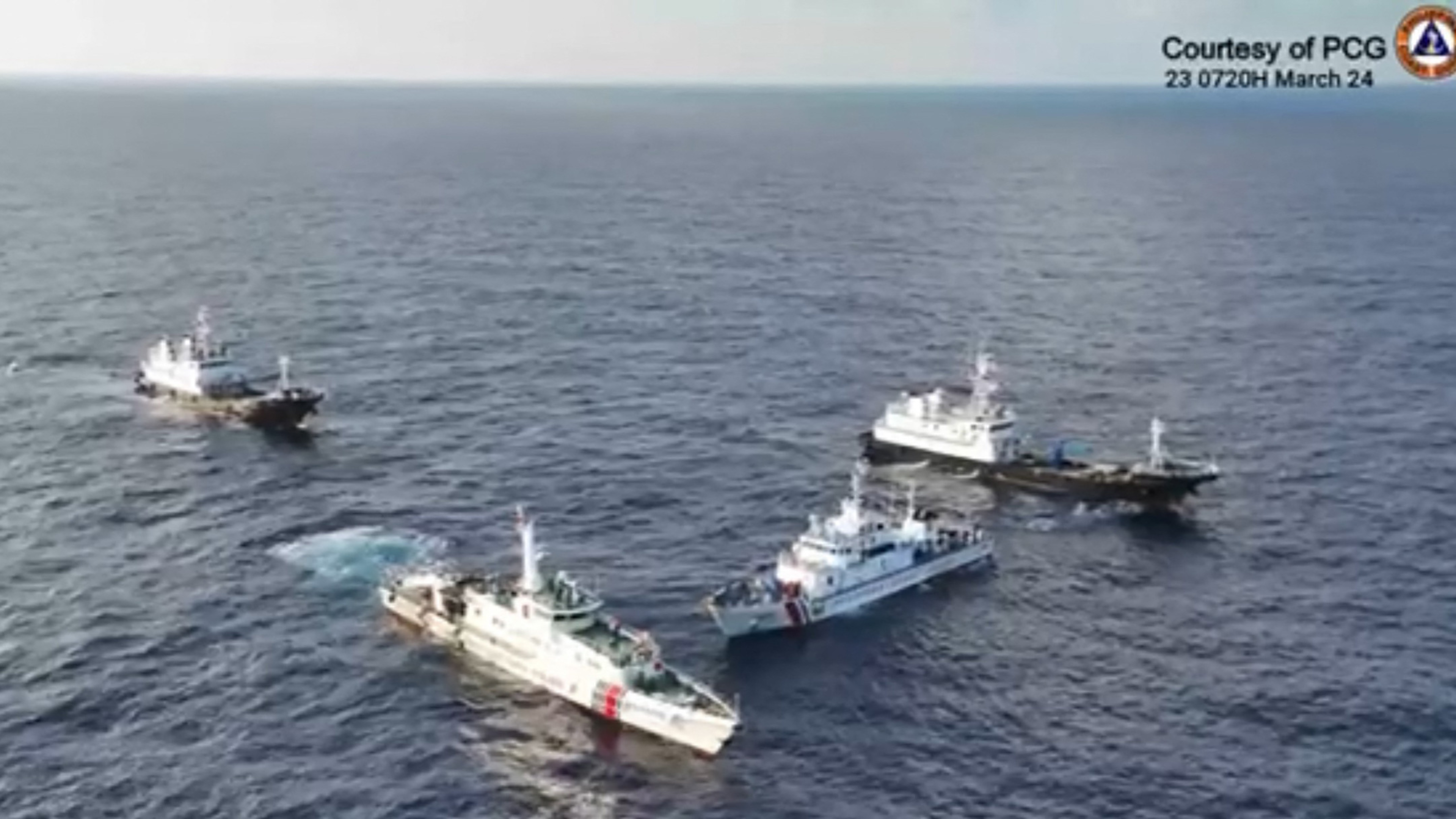President Ferdinand Marcos Jr. has ordered the beefing up of the country’s maritime security following the recent escalation of aggressive action by China against Philippine vessels in the West Philippine Sea (WPS).
Marcos issued Executive Order (EO) No. 57, which seeks to “strengthen the Philippines’ maritime security and maritime domain awareness” with the creation of the National Maritime Council (NMC).
“Despite efforts to promote stability and security in our maritime domain, the Philippines continues to confront a range of serious challenges that threaten not only the country’s territorial integrity, but also the peaceful existence of Filipinos, including their fundamental right to live in peace and freedom, free from fear of violence and threat,” the President said.

This frame grab from aerial video footage taken and released on March 23, 2024 by the Philippine Coast Guard (PCG) shows a China Coast Guard ship (2nd L) and vessels identified by the Philippine Coast Guard as “Chinese Maritime Militia” (L and R) surrounding the Philippine Coast Guard ship BRP Cabra (2nd R) during its supply mission near Second Thomas Shoal in waters of the disputed South China Sea. The Philippines accused the China Coast Guard of blocking and firing water cannon at a Filipino supply vessel on March 23 off a remote and contested South China Sea reef. (Photo by Handout / Philippine Coast Guard (PCG) / AFP)
READ: PH condemns China’s ‘irresponsible’ actions in West Philippine Sea
The Chief Executive issued EO 57 on March 25, two days after China Coast Guard (CCG) ships again bombarded with water cannon the Unaizah May 4, a Philippine-commissioned vessel that was on a resupply mission to Filipino troops stationed at a warship intentionally grounded 25 years ago on Ayungin (Second Thomas) Shoal.
The National Task Force on the West Philippine Sea (NTF-WPS) had said that the CCG also “acted recklessly and dangerously” against the Philippine Coast Guard (PCG) escort vessels, BRP Sindangan and BRP Cabra.
The UM4 sustained “heavy damage” while three of its crew were injured as a result of the water cannon attack.
Marcos said the Philippines is committed to upholding freedom of navigation and overflight in the West Philippine Sea, in accordance with the United Nations Convention on the Law of the Sea.
“Strengthening the country’s maritime security and domain awareness is imperative to comprehensively tackle the crosscutting issues that impact the nation’s national security, sovereignty, sovereign rights and maritime jurisdiction over its extensive maritime zones,” the President said.
READ: Marcos finds China actions in West Philippine Sea getting worrisome
Beijing claims almost all of the South China Sea, a conduit for more than $3 trillion of annual ship-borne commerce, but such assertion overlaps those of the Philippines, Vietnam, Indonesia, Malaysia and Brunei.
An arbitral tribunal, deciding on a case filed by Manila against Beijing, ruled in 2016 that China’s claims had no legal basis.
Expanded council
EO 57, which was released to the media on Sunday, renamed and reorganized the National Coast Watch Council (NCWC) into the NMC.
It authorized the NMC to accept donations, assistance or gifts either from foreign or local sources.
The NMC was directed to formulate guidelines that would lay out the specific roles that each support agency would play, as well as their personnel and equipment needs.
The same guidelines will also spell out a transition plan for the transfer of personnel and equipment from the NCWC.
The NMC will also set up and operate the National Maritime Center, through which it will oversee the implementation of the country’s national maritime security policy.
Marcos tasked the NMC to formulate policies and strategies “to ensure a unified, coordinated and effective governance framework for the country’s maritime security and domain awareness.”
The NMC will be headed by Executive Secretary Lucas Bersamin, with the secretaries of the following agencies as its members: the National Security Council (NSC), Department of National Defense, Department of Foreign Affairs, Department of Finance, Department of Agriculture, Department of Energy, Department of Environment and Natural Resources, Department of the Interior and Local Government, and Department of Transportation.
Support agencies to the NMC include the PCG, Armed Forces of the Philippines, Philippine National Police, Bureau of Customs, Bureau of Immigration, National Bureau of Investigation, Bureau of Fisheries and Aquatic Resources, Philippine Center for Transnational Crime, Philippine Drug Enforcement Agency, and National Mapping and Resource Information Authority.
The NTF-WPS will become an attached agency of the NMC and will put together the actions and capabilities of the member-agencies to ensure a “unified action in the WPS.”
Maintaining presence in West Philippine Sea
Following the President’s order to strengthen the country’s maritime security amid China’s increasing aggression, PCG spokesperson Rear Adm. Armando Balilo said on Sunday that they would “step up” their operations to enhance maritime domain awareness.
“Our job will still be the same. But because of the [latest aggression] incident, we might step up our operations, especially our maritime domain awareness, not only in the Ayungin area where there is always trouble, but also in other areas, including Bajo de Masinloc,” he told dzBB on Sunday.
“We’re a part of the [NSC] and the [NTF-WPS] and we will follow orders to maintain peace and security,” he added.
“Despite China’s aggression and recent incidents, our personnel remain faithful to their duty to follow the order of the government to maintain our presence in the West Philippine Sea and to not be deterred with what’s happening,” Balilo said. —WITH REPORTS FROM FRANCES MANGOSING AND REUTERS INQ

